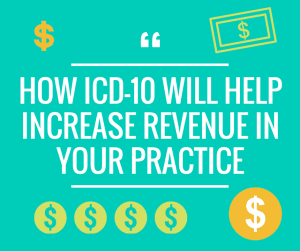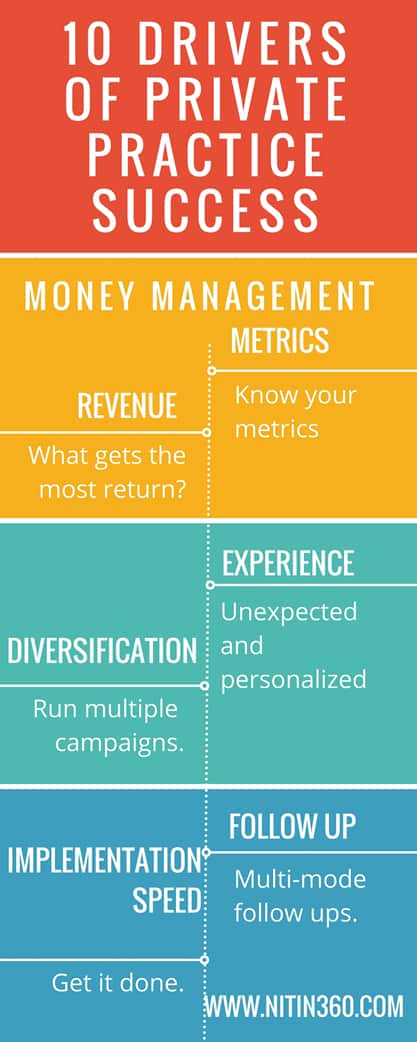I’ve always been an advocate of effective marketing, but the truth is that having a lot of patients does not always equate to an increase in revenue.
You’ve got to be able to bill your services effectively using an effective medical billing software.
Look at it this way. If you have a lot of patients, your financial systems (billing and coding, in particular) matter more than ever. You need to have the right systems for:
- Patient payment policies
- Billing
- Coding
Good news right?
I asked him a simple question.
His answer surprised me. Although the number of new patient visits in his clinic had gone up by 84% in the past six months, his net income had gone up only 28%.
Just 28%.

- The increased specificity and the granularity associated with ICD-10 opens up new financial opportunities for all private practice owners.
- ICD-10 codes opened new and unprecedented opportunities to communicate with patients in targeted, segmented ways like never before.
- ICD-10, when used correctly, can benefit your marketing efforts.
- There are several advantages to ICD-10 in a clinical setting, ranging from improved patient care to greater interoperability of information.
- Relying on the CMS GEMs translations can cause problems with documentation, billing and coding due to a lack of specificity.
- Understand and mitigate the impact of ICD-10 on payer contracts
Using the checklist I have created over the years I was able to determine there were FIVE big mistakes his office was making from a billing and coding standpoint. Chances are, your office is making the same mistakes and these could be decreasing your revenue.
How many times have you contacted an insurance company to get an eligibility verification, only to find that your claim gets denied after the service has been rendered? Have you also found that you get different information each time you call an insurance company? Chances are, you may get incorrect information from the representative over the phone, and this has big implications from a reimbursement standpoint.The best way to contest denials as a result of authorization errors is to document the name, agent number and start and end time of these calls. The insurance company does maintain a record of most calls, and if you provide them with specifics to retrieve the call, you’ll increase your chances of successfully contesting a claim.
One of the objectives of Medicare is to discourage unbundling of services. Ideally, CMS wants to see the most comprehensive procedure code sets that are appropriate and that support each other. They don’t want you to ‘break down’ a treatment into its component parts and bill separately for each part. Over-utilization of services (as a result of unbundling) is one of the reasons the entire profession faces reimbursements cutbacks.In addition to unbundling of services, the incorrect application of Medicare’s 8-minute rule can result in your office overbilling or underbilling or your services. The individual handling your billing should be able to differentiate between timed codes (requiring face to face interaction with the therapist and direct supervision) and non-timed codes (can only be billed for one unit per day and do not require the therapist’s direct supervision) in order to bill the appropriate number of units for each patient visit.
The payer expects you to have the right dates of service listed – MM/DD/YYYY format within timely filing windows. In addition to having the correct ICD codes listed, the patient’s name has to match the card exactly including middle initials and spelling. As mentioned earlier, a non-timed code billed with more than one unit constitutes overutilization.Compatibility between CPT code and diagnosis code is critical. Did you know that codes have to match, and this is not only payer specific, but also state specific? If the ICD and CPT codes don’t match up, your claim will be automatically denied. Discipline specific modifiers like GP can be used extensively, but modifiers like the KX modifier and modifier 59 have to be used sparingly. Modifer 59 in particular is a red flag for insurance companies. CCI edits were developed by CMS to govern the use of modifier 59 and to avoid unbundling of services. CCI edits check for mutually exclusive code pairs.
It’s our responsibility to educate patients and let them know about their financial responsibilities and payment options. Most patients are unaware of their co pays and deductibles. In most cases, a patient is a very difficult payer. Therefore, it is critical to explain the financial responsibilities to the patient and get their agreement in writing.








